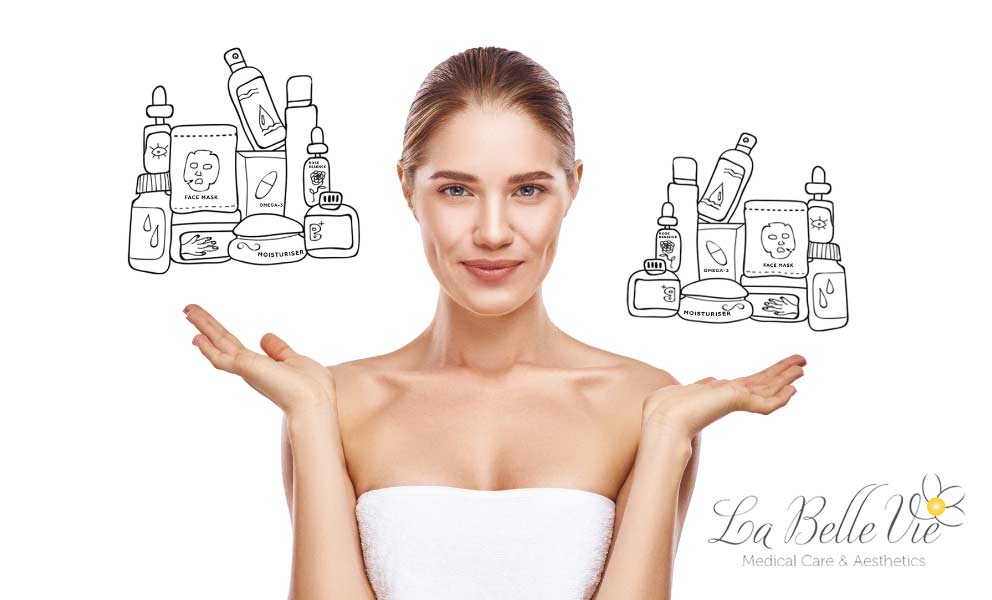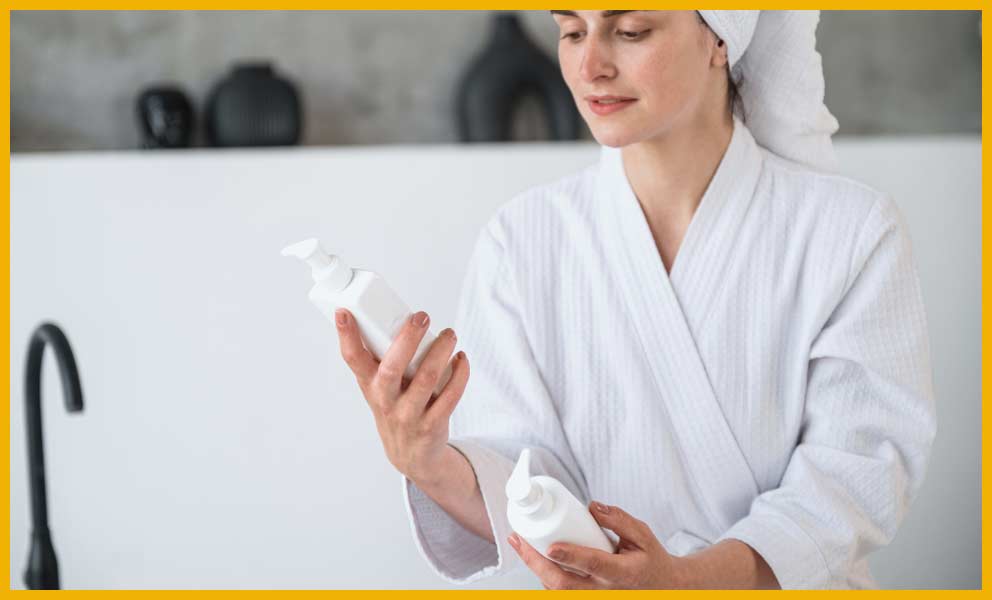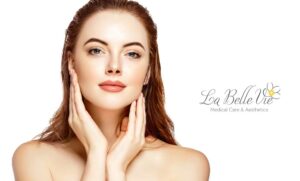Skincare products flood the market claiming to give you radiant and youthful skin. But which beauty elixirs live up to their promises?
To find good skincare products, you must understand the ingredients that go into them. Armed with this knowledge, you can make informed decisions about the products you use, ensuring they meet your specific needs and preferences.
La Belle Vie Medical Care & Aesthetics in Draper, Utah, is your trusted partner on this journey. If you’ve ever wondered about which skincare products to buy, and which ones to avoid, we’ve got you covered. Our practitioners have years of experience when it comes to the best way to care for your complexion.
You don’t need to spend a ton of money to have great skin. But you do need to know what NOT to put on your face. Here are the key ingredients you need for healthy, glowing skin and a list of those you should leave on the shelf!
Key Ingredients for Healthy Skin
Hyaluronic acid: a natural substance found in the skin that has the remarkable ability to hold water. When applied topically, hyaluronic acid can attract and retain moisture, leading to plumper, more hydrated skin.
Retinol: a form of vitamin A, Retinol is renowned for its anti-aging properties. It helps stimulate collagen production, reducing fine lines and wrinkles, and promotes skin cell turnover, resulting in a smoother and more even complexion.
Vitamin C: a powerful antioxidant that helps protect the skin from environmental damage, such as UV rays and pollution. Vitamin C also brightens the complexion, fades dark spots, and boosts collagen production for firmer skin.
Niacinamide: Also known as vitamin B3, Niacinamide helps to reduce inflammation, balance oil production, and enhance the skin’s natural barrier. This makes it an ideal choice for those with skin concerns such as acne and redness.
Salicylic acid: a beta-hydroxy acid (BHA), salicylic acid is known for its ability to penetrate and exfoliate within the pores. It is highly effective in treating acne, as it unclogs pores and reduces breakouts.
Peptides: these short chains of amino acids that play a vital role in collagen production, helping to firm and rejuvenate the skin. They can reduce the appearance of fine lines and wrinkles, making them a sought-after ingredient in anti-aging skincare.
Ceramides: natural lipids found in the skin that form a protective barrier to prevent moisture loss and protect against external irritants. When applied topically, ceramides help maintain the skin’s hydration and strengthen the skin’s barrier function.
Vitamin E: a powerful antioxidant that helps protect the skin from free radicals and supports skin repair. Vitamin E aids in maintaining skin health and can reduce the appearance of scars and dark spots.
Coenzyme Q10 (CoQ10): an antioxidant naturally produced by the body. When applied topically, it helps reduce the appearance of fine lines and improve overall skin texture. CoQ10 plays a role in protecting the skin from environmental damage.
Shea Butter: a natural moisturizer derived from the seeds of the shea tree. It nourishes and soothes the skin, making it an excellent choice for dry or sensitive areas, providing intense hydration and promoting skin softness.
Aloe Vera: well-known for its soothing properties, aloe vera is often used to relieve skin irritations, sunburn, and redness. Aloe vera gel can provide instant relief and promote skin healing.
Green Tea Extract: a potent antioxidant that helps protect the skin from environmental damage and reduces inflammation. Green tea extract is particularly beneficial for those with sensitive or irritated skin.
Witch Hazel: a natural astringent that can help tighten the skin and reduce inflammation. It’s commonly used in skincare products as a toner or as a soothing agent for various skin concerns.
Jojoba Oil: a natural moisturizer that closely resembles the skin’s natural oils, making it suitable for various skin types. Jojoba oil hydrates the skin without clogging pores, leaving it soft and supple.
Squalane: a lightweight, non-greasy oil that provides intense hydration and can improve skin elasticity. Squalane is particularly effective in combating dehydrated skin.
Zinc Oxide: a mineral sunscreen ingredient that provides broad-spectrum UV protection. It sits on the skin’s surface, blocking harmful UV rays and, is gentle on sensitive skin.
Panthenol (Vitamin B5): helps hydrate and soothe the skin, promoting a healthy skin barrier. It’s often used in skincare products to reduce redness and provide relief from irritation.
Common Harmful Skincare Ingredients
Now let’s take a look at some ingredients you DON’T want to put on your face (or body). Some manufacturers use harmful ingredients in their products. Why? These chemicals can help to increase shelf life and visual effects while reducing costs. The products look great, smell wonderful, and fool consumers. However, avoiding them is important for your skin’s health. Here are the most common harmful skincare ingredients to look out for:
Parabens: Used as preservatives, parabens can disrupt hormonal balance and have been linked to potential health risks.
Sodium Lauryl Sulfate (SLS) and Sodium Laureth Sulfate (SLES): These surfactants can be harsh on the skin, leading to dryness and irritation.
Phthalates: Often used in fragrances, they may disrupt hormones and potentially harm reproductive and developmental health.
Formaldehyde and Formaldehyde-releasing Preservatives: Known as carcinogens, they can cause skin irritation and allergies.
Synthetic Fragrances: These can contain numerous undisclosed chemicals, causing skin irritation and allergies in some individuals.
Mineral Oil: A petroleum-derived ingredient that can clog pores and potentially lead to acne and skin issues.
Polyethylene (Microbeads): Harmful to the environment, these tiny plastic particles can be abrasive on the skin.
Toluene: Often found in nail products, it may harm the central nervous system and cause skin and respiratory issues.
Triclosan: An antibacterial agent used in some skincare products, it may contribute to antibiotic resistance.
Synthetic Colors (e.g., FD&C or D&C): Artificial colors may contain toxic heavy metals and can cause skin sensitivities.
PABA (Para-Aminobenzoic Acid): An ingredient used in sunscreens that can cause allergic reactions and skin sensitivity.
DEA (Diethanolamine), MEA (Monoethanolamine), and TEA (Triethanolamine): These can be irritants and may react with other ingredients to form potentially harmful compounds.
Oxybenzone: A chemical sunscreen ingredient that can disrupt hormonal balance and may be harmful to coral reefs.
Petrolatum: Derived from petroleum, it can clog pores and trap impurities, potentially leading to breakouts.
Ethanolamines (MEA, DEA, TEA): Used in cosmetics as emulsifiers, they can cause skin and eye irritation.
BHA (Butylated Hydroxyanisole) and BHT (Butylated Hydroxytoluene): Common preservatives that may cause skin and eye irritation.
Propylene Glycol: Used in skincare products, it can lead to skin sensitivities and irritation.
Silicone (Cyclopentasiloxane and Dimethicone): While not inherently harmful, they can trap debris and prevent other beneficial ingredients from penetrating the skin.
Talc: A potential carcinogen, talc is sometimes used in cosmetics, particularly in powders.
Synthetic Retinoids (e.g., Retinyl Palmitate): They can increase skin sensitivity to the sun and may not be as effective as other retinoids.
How To Read The Product Label
To read a skincare product’s ingredient label effectively, start by looking for the most prominent ingredients at the beginning. Focus on any active or problematic substances. Watch for potential allergens or irritants and harmful ingredients. Lastly, familiarize yourself with scientific names, avoid hidden synonyms, and prioritize transparency in labeling for safer, informed choices.
Knowing what is inside of a skincare product is the best way to find the right ones for you. Understanding skincare ingredients also empowers you to make informed choices, ensuring your skincare routine is effective and tailored to your needs. But if you ever wonder about the products you’re using, give us a call!
La Belle Vie’s commitment to educating consumers on skincare ingredients reflects our passion for helping you achieve healthier, more radiant skin. Take the next step in your skincare journey by contacting La Belle Vie Medical Care & Aesthetics in Draper, Utah for expert guidance and treatments that cater to your unique needs. Call today and embark on your journey to healthier, more beautiful skin.
- The Calm Complexion: Stress-Reducing Tips for Healthier, Happier Skin - July 18, 2024
- MIC Injections: Medical Weight Loss - July 18, 2024
- Testosterone Treatments for Men and Women - July 9, 2024







